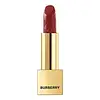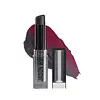What's inside
What's inside
 Key Ingredients
Key Ingredients

 Benefits
Benefits

 Concerns
Concerns

 Ingredients Side-by-side
Ingredients Side-by-side

Octyldodecanol
EmollientPolybutene
Diisostearyl Malate
EmollientHydrogenated Styrene/Methylstyrene/Indene Copolymer
Polyethylene
AbrasiveCera Microcristallina
Emulsion StabilisingCaprylic/Capric Triglyceride
MaskingDicalcium Phosphate
AbrasiveStearalkonium Bentonite
Gel FormingPropylene Carbonate
SolventEthylhexyl Palmitate
EmollientAroma
Mica
Cosmetic ColorantPentaerythrityl Tetra-Di-T-Butyl Hydroxyhydrocinnamate
AntioxidantBenzyl Salicylate
PerfumingLinalool
PerfumingSilica Dimethyl Silylate
EmollientHexyl Cinnamal
PerfumingButylene Glycol
HumectantCaprylyl Glycol
EmollientPhenoxyethanol
PreservativeSodium Hyaluronate
HumectantCalcium Aluminum Borosilicate
Hexylene Glycol
EmulsifyingAluminum Calcium Sodium Silicate
Calcium Titanium Borosilicate
AbrasiveAlumina
AbrasiveCalcium Sodium Borosilicate
Silica
AbrasiveSynthetic Fluorphlogopite
Tin Oxide
AbrasiveCI 77891
Cosmetic ColorantIron Oxides
CI 15850
Cosmetic ColorantCI 42090
Cosmetic ColorantCI 45410
Cosmetic ColorantCI 19140
Cosmetic ColorantCI 15985
Cosmetic ColorantCI 75470
Cosmetic ColorantOctyldodecanol, Polybutene, Diisostearyl Malate, Hydrogenated Styrene/Methylstyrene/Indene Copolymer, Polyethylene, Cera Microcristallina, Caprylic/Capric Triglyceride, Dicalcium Phosphate, Stearalkonium Bentonite, Propylene Carbonate, Ethylhexyl Palmitate, Aroma, Mica, Pentaerythrityl Tetra-Di-T-Butyl Hydroxyhydrocinnamate, Benzyl Salicylate, Linalool, Silica Dimethyl Silylate, Hexyl Cinnamal, Butylene Glycol, Caprylyl Glycol, Phenoxyethanol, Sodium Hyaluronate, Calcium Aluminum Borosilicate, Hexylene Glycol, Aluminum Calcium Sodium Silicate, Calcium Titanium Borosilicate, Alumina, Calcium Sodium Borosilicate, Silica, Synthetic Fluorphlogopite, Tin Oxide, CI 77891, Iron Oxides, CI 15850, CI 42090, CI 45410, CI 19140, CI 15985, CI 75470
Pentaerythrityl Tetraisostearate
EmollientPolybutene
Diisostearyl Malate
EmollientCaprylic/Capric Triglyceride
MaskingRicinus Communis Seed Oil
MaskingEuphorbia Cerifera Wax
Octyldodecanol
EmollientHydrogenated Polydecene
EmollientPolyglyceryl-3 Diisostearate
EmulsifyingBis-Diglyceryl Polyacyladipate-2
EmollientHydrogenated Coco-Glycerides
EmollientSynthetic Wax
AbrasiveEthylhexyl Palmitate
EmollientOzokerite
Emulsion StabilisingButyrospermum Parkii Butter
Skin ConditioningMangifera Indica Seed Butter
Skin ConditioningTocopheryl Acetate
AntioxidantPhenoxyethanol
PreservativePentaerythrityl Tetra-Di-T-Butyl Hydroxyhydrocinnamate
AntioxidantEthylhexylglycerin
Skin ConditioningCaprylyl Glycol
EmollientTrihydroxystearin
Skin ConditioningCitrus Aurantium Amara Flower Oil
MaskingSodium Hyaluronate
HumectantAmorphophallus Konjac Root Powder
AbrasiveLimonene
PerfumingLinalool
PerfumingCI 45410
Cosmetic ColorantCI 42090
Cosmetic ColorantCI 77499
Cosmetic ColorantPentaerythrityl Tetraisostearate, Polybutene, Diisostearyl Malate, Caprylic/Capric Triglyceride, Ricinus Communis Seed Oil, Euphorbia Cerifera Wax, Octyldodecanol, Hydrogenated Polydecene, Polyglyceryl-3 Diisostearate, Bis-Diglyceryl Polyacyladipate-2, Hydrogenated Coco-Glycerides, Synthetic Wax, Ethylhexyl Palmitate, Ozokerite, Butyrospermum Parkii Butter, Mangifera Indica Seed Butter, Tocopheryl Acetate, Phenoxyethanol, Pentaerythrityl Tetra-Di-T-Butyl Hydroxyhydrocinnamate, Ethylhexylglycerin, Caprylyl Glycol, Trihydroxystearin, Citrus Aurantium Amara Flower Oil, Sodium Hyaluronate, Amorphophallus Konjac Root Powder, Limonene, Linalool, CI 45410, CI 42090, CI 77499
Ingredients Explained
These ingredients are found in both products.
Ingredients higher up in an ingredient list are typically present in a larger amount.
This ingredient is an emollient, solvent, and texture enhancer. It is considered a skin-softener by helping the skin prevent moisture loss.
It helps thicken a product's formula and makes it easier to spread by dissolving clumping compounds.
Caprylic Triglyceride is made by combining glycerin with coconut oil, forming a clear liquid.
While there is an assumption Caprylic Triglyceride can clog pores due to it being derived from coconut oil, there is no research supporting this.
Learn more about Caprylic/Capric TriglycerideCaprylyl Glycol is a humectant and emollient, meaning it attracts and preserves moisture.
It is a common ingredient in many products, especially those designed to hydrate skin. The primary benefits are retaining moisture, skin softening, and promoting a healthy skin barrier.
Though Caprylyl Glycol is an alcohol derived from fatty acids, it is not the kind that can dry out skin.
This ingredient is also used as a preservative to extend the life of products. It has slight antimicrobial properties.
Learn more about Caprylyl GlycolCi 42090 is a synthetic dye created from petroleum. It is used to give a bright blue color to cosmetics, medicine, and food.
CI 45410 is a synthetic red-pigment and dye.
It often goes by both Red 28 or Red 27; manufacturers label both ingredients as CI 45410.
This dye is commonly found in makeup because it imparts a vivid color. Some types of this dye change color based on pH level and interaction with moisture:
Your skin has a natural pH of around 4.5 - 5.5.
According to the FDA, CI 45410 is not permitted for use in eye products.
Red 27 is a flourescein dye and commonly used as a fluorescent tracer in medicine.
Learn more about CI 45410Diisostearyl Malate is an emollient and most often used in lip products. It comes from isostearyl alcohol, a fatty acid, and malic acid, an AHA.
As an emollient, Diisostearyl Malate helps create a thin film on your skin to trap moisture in. This helps keep your skin soft and smooth.
Ethylhexyl Palmitate, also known as octyl palmitate, is created from 2-ethylhexyl alcohol and palmitic acid. It is a fatty acid ester.
The fatty acid content of Ethylhexyl Palmitate makes it an emollient. Emollients help soften and hydrate your skin by trapping moisture within.
Ethylhexyl Palmitate is also used to help improve the texture of cosmetics. It helps other ingredient dissolve in products and help disperse ingredients more evenly.
You'll likely find this ingredient in sunscreen, as it is often used to mix UV-blocking ingredients such as avobenzone and ethylhexyl triazone.
It can also help stabilize the fragrances in a product as a fragrance fixative.
Ethylhexyl Palmitate can be used to substitute mineral oil.
Due to its high fatty acid content, it may not be fungal-acne safe.
Learn more about Ethylhexyl PalmitateLinalool is a fragrance and helps add scent to products. It's derived from common plants such as cinnamon, mint, citrus, and lavender.
Like Limonene, this ingredient oxidizes when exposed to air. Oxidized linalool can cause allergies and skin sensitivity.
This ingredient has a scent that is floral, spicy tropical, and citrus-like.
Learn more about LinaloolOctyldodecanol is a fatty alcohol. It is primarily used to enhance the texture of products.
As an emulsifier, Octyldodecanol helps prevent the oils and waters from separating. It also prevents ingredients from creating foam when shaken.
Octyldodecanol is created by reducing fatty acid to an alcohol.
Due to its high molecular weight, it does not get absorbed into the skin.
Learn more about OctyldodecanolPentaerythrityl Tetra-Di-T-Butyl Hydroxyhydrocinnamate (long name, huh?) is a synthetic antioxidant.
It is used to help stabilize other antioxidants or prevent the color from changing in a product.
As an antioxidant, it helps fight free-radical molecules. Free-radical molecules are capable of damaging our cells and other genetic material. Thus, antioxidants may reduce the signs of aging.
This ingredient is oil-soluble.
Learn more about Pentaerythrityl Tetra-Di-T-Butyl HydroxyhydrocinnamatePhenoxyethanol is a preservative that has germicide, antimicrobial, and aromatic properties. Studies show that phenoxyethanol can prevent microbial growth. By itself, it has a scent that is similar to that of a rose.
It's often used in formulations along with Caprylyl Glycol to preserve the shelf life of products.
Polybutene is used to help control the viscosity of a product. This just means it helps adjusts the texture.
It is a polymer and does not get absorbed into the skin due to its large size.
Studies found this ingredient did not irritate skin in concentrations below 15%.
Learn more about PolybuteneSodium Hyaluronate is hyaluronic acid's salt form. It is commonly derived from the sodium salt of hyaluronic acid.
Like hyaluronic acid, it is great at holding water and acts as a humectant. This makes it a great skin hydrating ingredient.
Sodium Hyaluronate is naturally occurring in our bodies and is mostly found in eye fluid and joints.
These are some other common types of Hyaluronic Acid:
Learn more about Sodium Hyaluronate